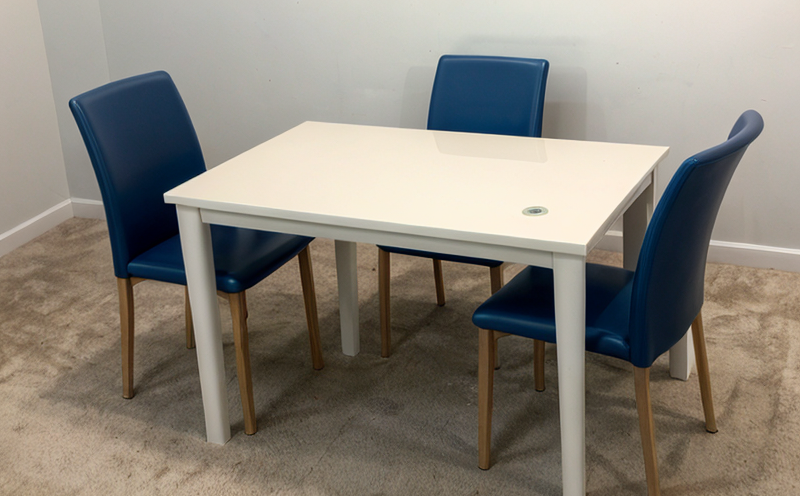IEC 60243 Dielectric Strength Testing of Interior Plastics
The IEC 60243 standard specifies procedures for determining the dielectric strength and breakdown voltage of solid insulating materials. This test is critical for ensuring the safety and reliability of interior plastics used in various applications, including furniture, automotive interiors, electronic components, and medical devices.
Dielectric strength testing evaluates a material's ability to withstand an electric field without failure due to electrical breakdown or insulation breakdown. In this context, it ensures that the plastic materials used do not conduct electricity under specified conditions, which is crucial for preventing short circuits and ensuring user safety in environments where electrical components are present.
The test involves applying an alternating voltage across a specimen of the plastic material until breakdown occurs. The voltage applied increases incrementally to ensure that the material's maximum dielectric strength is accurately determined. This process helps identify any weaknesses or potential failure points within the plastic, which can be addressed through material selection and design improvements.
For interior plastics used in furniture and other household items, ensuring dielectric stability is paramount, especially when dealing with materials that might come into contact with electrical components or household appliances. The IEC 60243 test provides a standardized method for manufacturers to verify the safety of these materials before they are incorporated into products.
Understanding the dielectric properties of plastics also aids in optimizing the design and manufacturing processes. By identifying the optimal dielectric strength, engineers can select appropriate plastic types that balance electrical insulation with mechanical properties such as flexibility, durability, and thermal stability. This knowledge is particularly valuable for R&D teams working on developing new materials or improving existing ones.
Compliance with IEC 60243 is essential for manufacturers seeking to meet international standards and ensure their products are safe and reliable across different markets. By conducting this test, companies can demonstrate their commitment to quality control and safety, which is increasingly important in today's competitive global market.
- International Acceptance: IEC 60243 has been widely adopted by many countries as a standard for dielectric strength testing of insulating materials. Its acceptance spans various sectors including electronics, automotive, and household appliances.
The test's reliability and consistency are achieved through precise measurement techniques and standardized procedures. This ensures that the results are reproducible and can be trusted across different laboratories and regions. As a result, manufacturers worldwide rely on IEC 60243 to ensure their products meet stringent safety standards.
In summary, the IEC 60243 dielectric strength test is an indispensable tool for ensuring the electrical safety of interior plastics used in furniture and other household items. By conducting this test, manufacturers can gain valuable insights into the performance characteristics of their materials, which ultimately contributes to safer and more reliable products.
Why Choose This Test
Selecting the IEC 60243 dielectric strength test is a strategic decision for several reasons. Firstly, it provides a robust framework for assessing the electrical safety of interior plastics, which is critical in preventing short circuits and ensuring user safety.
The test's standardized procedures ensure that results are consistent and reliable across different laboratories and regions. This consistency is particularly important for manufacturers operating globally, as it allows them to meet international standards and regulations confidently.
Moreover, the test helps manufacturers identify potential weaknesses in their materials early on, enabling them to make informed decisions about material selection and design improvements. This proactive approach can significantly reduce the risk of product failures and recalls, thereby protecting brand reputation and consumer trust.
The IEC 60243 test also supports regulatory compliance, which is becoming increasingly important as governments worldwide implement stricter safety standards for household items. By ensuring that products meet these standards through rigorous testing, manufacturers can avoid costly legal issues and potential market disruptions.
In addition to its technical benefits, the test contributes to a safer and more reliable product range. This not only enhances consumer satisfaction but also fosters trust between manufacturers and their customers. In today's competitive market, maintaining high-quality standards is key to standing out and building long-term customer relationships.
Overall, choosing IEC 60243 dielectric strength testing for interior plastics offers a comprehensive solution that addresses various aspects of product safety, quality assurance, and regulatory compliance. It provides manufacturers with the confidence they need to produce safe and reliable products that meet international standards.
Customer Impact and Satisfaction
The implementation of IEC 60243 dielectric strength testing has a direct impact on customer satisfaction by enhancing product safety and reliability. By ensuring that interior plastics used in furniture and other household items meet stringent electrical safety standards, manufacturers can provide products that are not only functional but also safe for use.
Customers appreciate products that are reliable and free from potential risks associated with electrical failures or insulation breakdowns. When manufacturers adhere to international standards like IEC 60243, they demonstrate a commitment to quality and safety, which in turn builds trust among consumers.
The test's reliability and accuracy contribute to the overall quality of products, leading to higher customer satisfaction. This is particularly important for furniture and interior items where electrical components may be present or could come into contact with users. By ensuring that these materials meet strict dielectric strength criteria, manufacturers can provide peace of mind to their customers.
Furthermore, compliance with IEC 60243 helps manufacturers avoid costly recalls and legal issues associated with product failures due to electrical safety concerns. This proactive approach not only protects the brand's reputation but also ensures that products continue to meet customer expectations over time.
In summary, implementing IEC 60243 dielectric strength testing for interior plastics enhances product safety, reliability, and overall quality. By doing so, manufacturers can significantly improve customer satisfaction and build stronger relationships with their customers.





